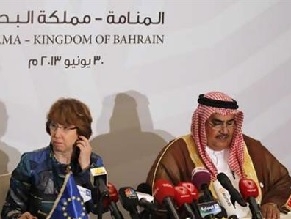|
World Jewish News

The EU-GCC statement went one step further in calling on the Jewish State “to immediately end all settlement activity in East Jerusalem and the rest of the West Bank, including natural growth, and to dismantle all outpost”.
|
Ashton silent on Mideast as EU-Gulf joint Council insists Israel must ‘end all settlement activity in East Jerusalem and the res
01.07.2013, Israel and the World EU foreign policy chief Catherine Ashton made scant reference to “regional challenges” following a meeting of the EU-Gulf Cooperation Council (GCC) in Bahrain Sunday, as she evaded explicit mention of a joint statement adopted by the meeting which was highly critical of Israel’s settlement policy.
Ministers at the meeting which Ashton co-chaired alongside Bahraini Foreign Minister Sheikh Khalid bin Ahmed bin Mohamed al Khalifa issued strongly-worded conclusions following their annual meeting, in which they called for a “vital” lasting peace agreement in the Middle East, with a two state solution based on the principles of the largely discarded Arab Peace Initiative, with no acknowledgement of post-1967 borders.
Echoing previous EU rhetoric which has deemed Israeli settlement policy as “an obstacle to peace” and illegal under international law, the statement went one step further in calling on the Jewish State “to immediately end all settlement activity in East Jerusalem and the rest of the West Bank, including natural growth, and to dismantle all outpost”.
The critical resolution is likely to irk Israeli authorities, after a stalled anticipated resolution at last week’s EU foreign affairs council, in the aftermath of Israeli Premier Benjamin Netanyahu’s reported lobbying of Ashton on her visit to Jerusalem last month, with officials claiming he stated such a declaration would be “unworthy and the timing is unhelpful and even harmful”. “The announcement will only encourage the Palestinians to refrain from returning to the negotiating table. With this announcement, the Palestinians will think it worth their while to wait until Kerry’s efforts fail, since the Europeans will support them in any case, laying the responsibility for failure on Israel’s shoulders,” Israeli media further reported Netanyahu as saying.
Israeli authorities had claimed the apparent lack of consensus amongst Europe’s foreign ministers on settlements as a victory. Ashton, for her part, invoked only ministers’ discussions on Syria, as well as the potential for a spillover of hostilities into neighbouring Lebanon, in an apparent effort to minimise the inevitable outrage the contentious statement will inevitable provoke in certain quarters.
Ahead of her arrival in the Bahraini capital of Manama for Sunday’s meeting, however, it was a different story, as she predicted a productive exchange of views on the Mideast following her tour of the region last month, which saw her take i Jordan, Iraq, Egypt and the Palestinian territories, as well as Jerusalem.
“We must continue to work together to address regional challenges of common concern, in particular the crisis in Syria. I am convinced of the need to intensify our cooperation in the months and years ahead,” she said in her official comment.
Elsewhere, the joint council discussed the ongoing Iranian threat, in light of last month’s elections which brought self-declared “moderate” Hassan Rouhani to power. Calling on the Islamist regime “to play a constructive role in the region, based on respect for the principles of national sovereignty and non-interference”, the ministers committed their ongoing support for international diplomatic efforts led by Ashton, as they insisted Iran should cooperate with negotiators and nuclear inspectors alike “regarding the exclusively peaceful use of nuclear energy”.
Calling for a “comprehensive political solution” to the ever-escalating Syrian crisis, they also took a critical view of Lebanese group Hezbollah’s increasing incursions into the conflict on the side of authoritarian ruler Bashar al Assad, as they succinctly “condemned the participation of Hezbollah and other foreign forces in military operations in Syria”.
The Gulf Cooperation Council unites six members of Arab states bordering on the Persian Gulf, including Bahrain, Kuwait, Oman, Qatar, Saudi Arabia and the United Arab Emirates.
EJP
|
|
